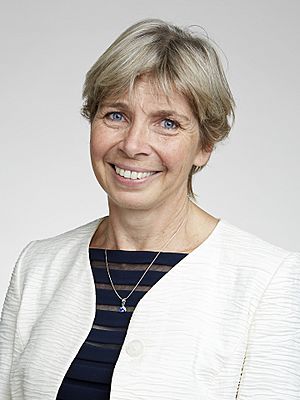Sarah Cleaveland facts for kids
Quick facts for kids
Sarah Cleaveland
|
|
|---|---|

Cleaveland in 2016
|
|
| Born | 1960/1961 (age 64–65) Malaysia
|
| Alma mater |
|
| Awards | Leeuwenhoek Lecture (2018) Frink Medal (2016) |
| Scientific career | |
| Fields |
|
| Institutions | University of Glasgow |
| Thesis | The epidemiology of rabies and canine distemper in the Serengeti, Tanzania (1996) |
| Doctoral students | Anna Louise Meredith |
Sarah Cleaveland is a leading expert in animal health. She is a vet and a professor at the University of Glasgow. She studies how diseases spread among animals and people.
Contents
Becoming a Vet and Scientist
Sarah Cleaveland studied at the University of Cambridge. In 1988, she earned her degree to become a vet.
Later, she continued her studies at the London School of Hygiene & Tropical Medicine. In 1996, she earned her PhD. Her research focused on diseases like canine distemper and rabies in the Serengeti area of Tanzania.
Her Work and Research
After her studies, Professor Cleaveland worked at the University of Edinburgh. In 2008, she joined the University of Glasgow. There, she became a professor who studies how diseases affect both animals and people.
Fighting Rabies in Tanzania
A big part of Professor Cleaveland's work has been in northern Tanzania. She has focused on diseases that can spread from animals to humans, especially rabies.
She helped start large-scale vaccination programs for pet dogs in the Serengeti. These programs have done amazing things:
- They have saved hundreds of human lives by stopping the spread of rabies.
- They have also protected wild animals, like the endangered African wild dog, from getting sick.
Her research has received support from important science organizations.
Awards and Special Recognitions
Professor Cleaveland has received many awards for her important work.
- In 2008, she was the first woman to win the British Veterinary Association Trevor Blackburn Award. This award recognized her work on infectious diseases in Africa.
- She helped start the Alliance for Rabies Control. This group works to stop human deaths from rabies and reduce the disease in animals.
- She became a Fellow of the Royal Society of Edinburgh in 2012.
- In 2015, she was elected to the National Academy of Medicine in the USA.
- In 2016, she became a Fellow of the Royal Society, which is a very high honor for scientists.
- In 2014, she was given the title of Officer of the Order of the British Empire (OBE). This was for her great contributions to understanding animal diseases.
- In 2018, the Royal Society gave her the Leeuwenhoek Lecture award. This was for her amazing efforts to help get rid of rabies around the world.
- In 2020, she was awarded the George Macdonald Medal.
 | Calvin Brent |
 | Walter T. Bailey |
 | Martha Cassell Thompson |
 | Alberta Jeannette Cassell |

